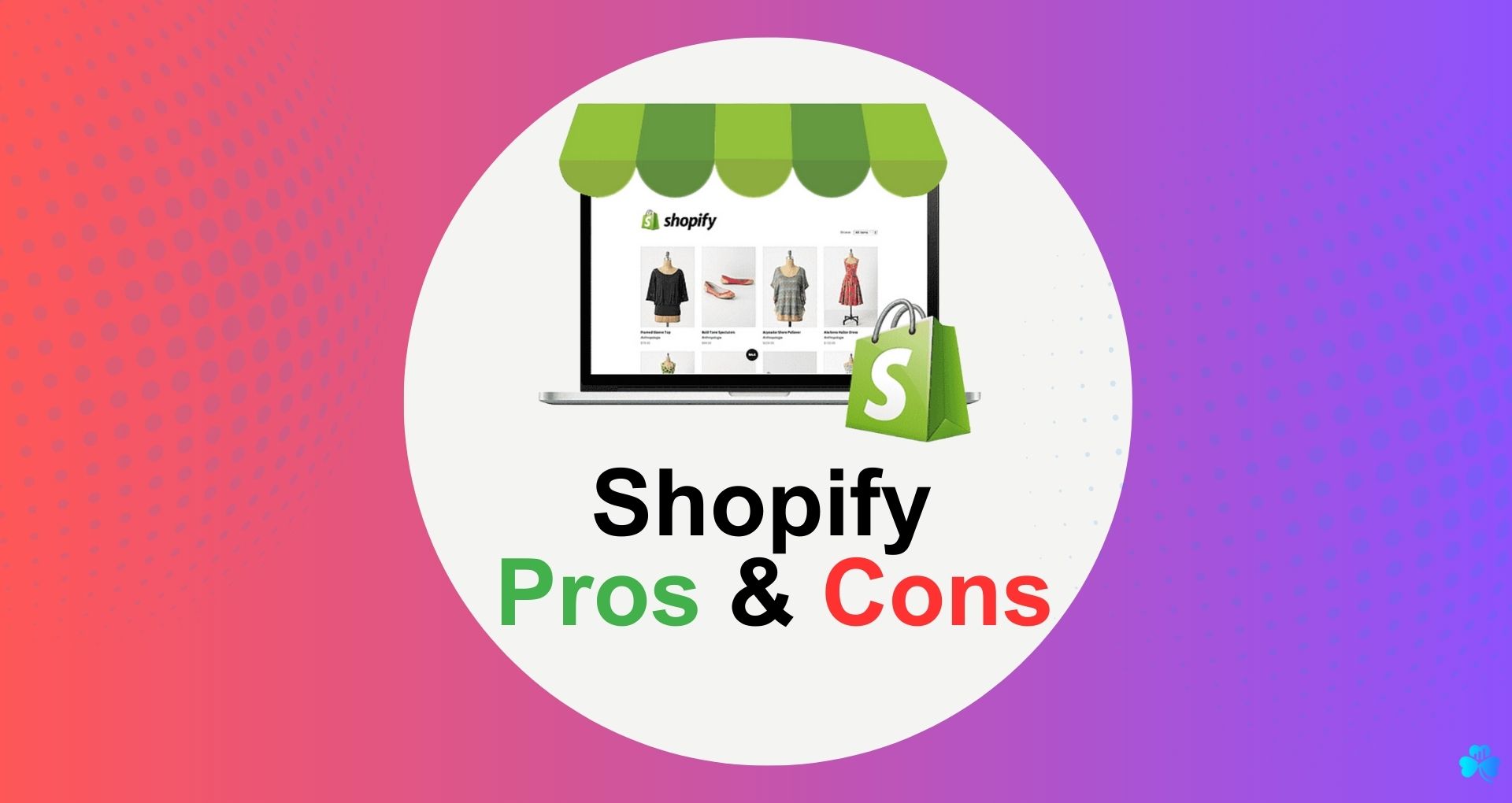Looking to build your online store with Shopify?
Before you commit, let's have an honest discussion about its pros and cons.
This straightforward analysis cuts through the "Fluff", offering a realistic perspective on Shopify's strengths and weaknesses, ensuring you have a clear understanding of what to expect."
Keep reading to discover how Shopify advantages and disadvantages stack up and whether they balance out.
This article might contain referral links from our chosen partners, that may bring us a small commission at no additional cost to you. Please read our disclosure page for more details.
What is Shopify?
Shopify is one of the most popular ecommerce platform that allows many online businesses to start, grow, and manage their own ecommerce platforms.

Shopify, in fact from the latest studies source- Trendsbuiltwith Suggested that 29% of all shops in the USA (13,057,411) -last updated- 09/05/2023) are in fact powered by the Shopify platform.
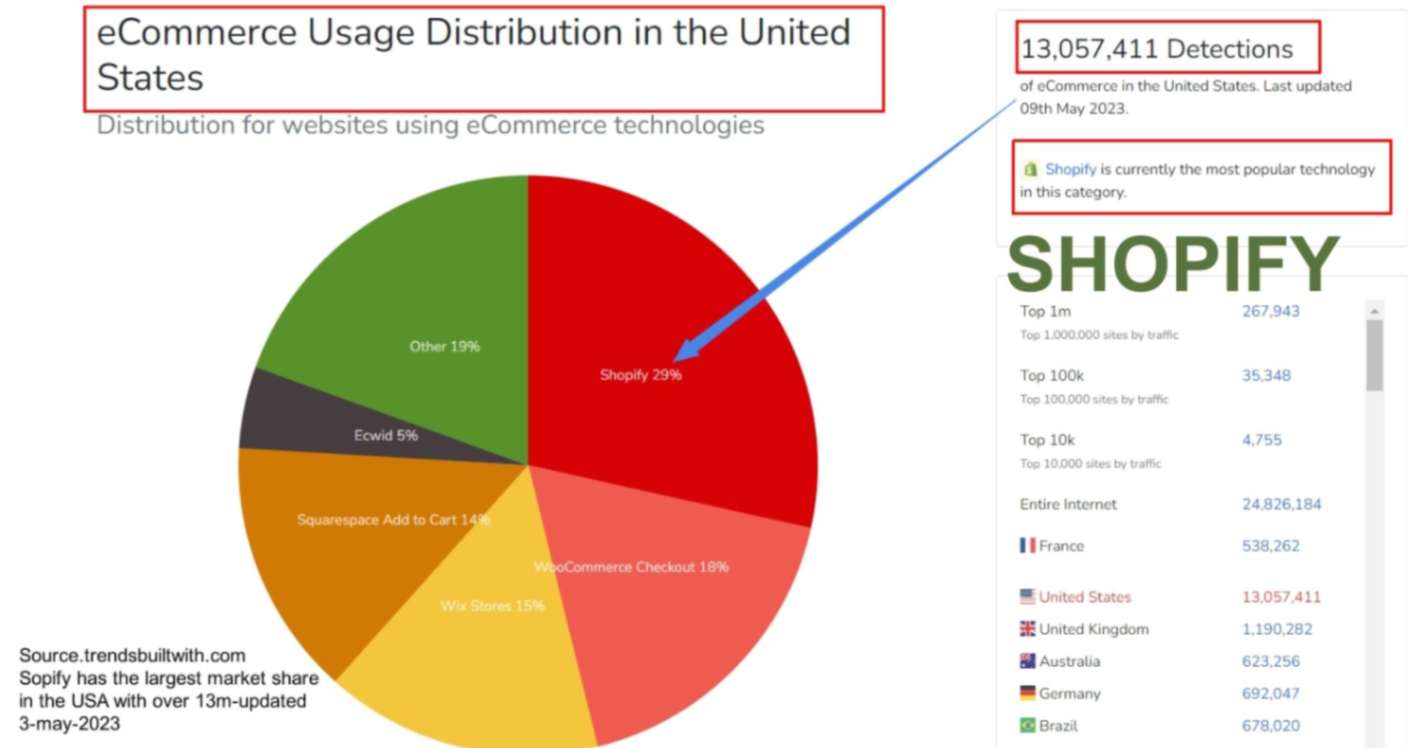
Source-trends.builtwith.com
Shopify combines all the tools and aspects of your commerce on a single platform, allowing merchants to create and personalize and optimize an online store.
You are able to sell across various channels, from the web and mobile to brick-and-mortar locations and pop-up shops.
Remember that Shopify is not a content a Content Management System (CMS)
You can't really dish out rich content eg Vlogs, blogs or make carousels exporting blog posts, videos etc.
Shopify gives a fantastic opportunity to enjoy a free trial period without any obligations. After the free trial, you can choose from three different paid plans:
- The basic plan costs $39 per month
- Then there is a plan that costs $105 per month
- The premium plan is available for $399 per month
You can choose the one that suits your business needs.
How Does Shopify Work?

Shopify operates through a simple five-step process:
- Firstly, you need to choose a payment plan that suits your online business. You have the choice of three paid plans, and the basic plan is widely used for small online businesses.
- Next, synchronize your business's domain name with your online store. You can obtain a domain name from GoDaddy, Namecheap, Hostinger, Squarespace, and Hostgator.
- After that, choose the templates and themes that best fit your business.
Shopify Has a wide range of beautiful storefront themes and templates for different types of online stores, and you can easily modify them using the drag-and-drop editor. - Once you select your preferred template, optimize your Shopify website and add products to your store.
- Finally, promote your business to your target audience. These are the basics of how to start a Shopify store, but there is much more to learn about this platform.
Shopify advantages and disadvantages:
Advantages of Shopify

It offers many benefits to online businesses of all types and sizes. The platform provides a lot, from ease of use to multiple payment options.
Here are some of the top advantages of using Shopify:
1. Easy To Use
Shopify is known for its ease of use, making it an excellent choice for small business owners who want to quickly and easily set up an online store.
One of the reasons Shopify is a very user friendly platform is because of its easy to use drag-and-drop tool, which allows users to customize their store without any coding knowledge.
Shopify also has a lot of resources and tutorials to help users learn how to use the platform.
This means that even people who know little about e-commerce can feel confident opening their online stores.
2. Diverse Features
Shopify provides easy access to a diverse range of features, including adding products, inventory management, and shipping setup.
The platform also allows you to create discount codes through its built-in features.
They also offer more advanced features and functionalities for more specialized needs, such as B2B integration or wholesale requirements.
So, you'll be able to find whatever you need to enhance your store.
3. Great Customer Support
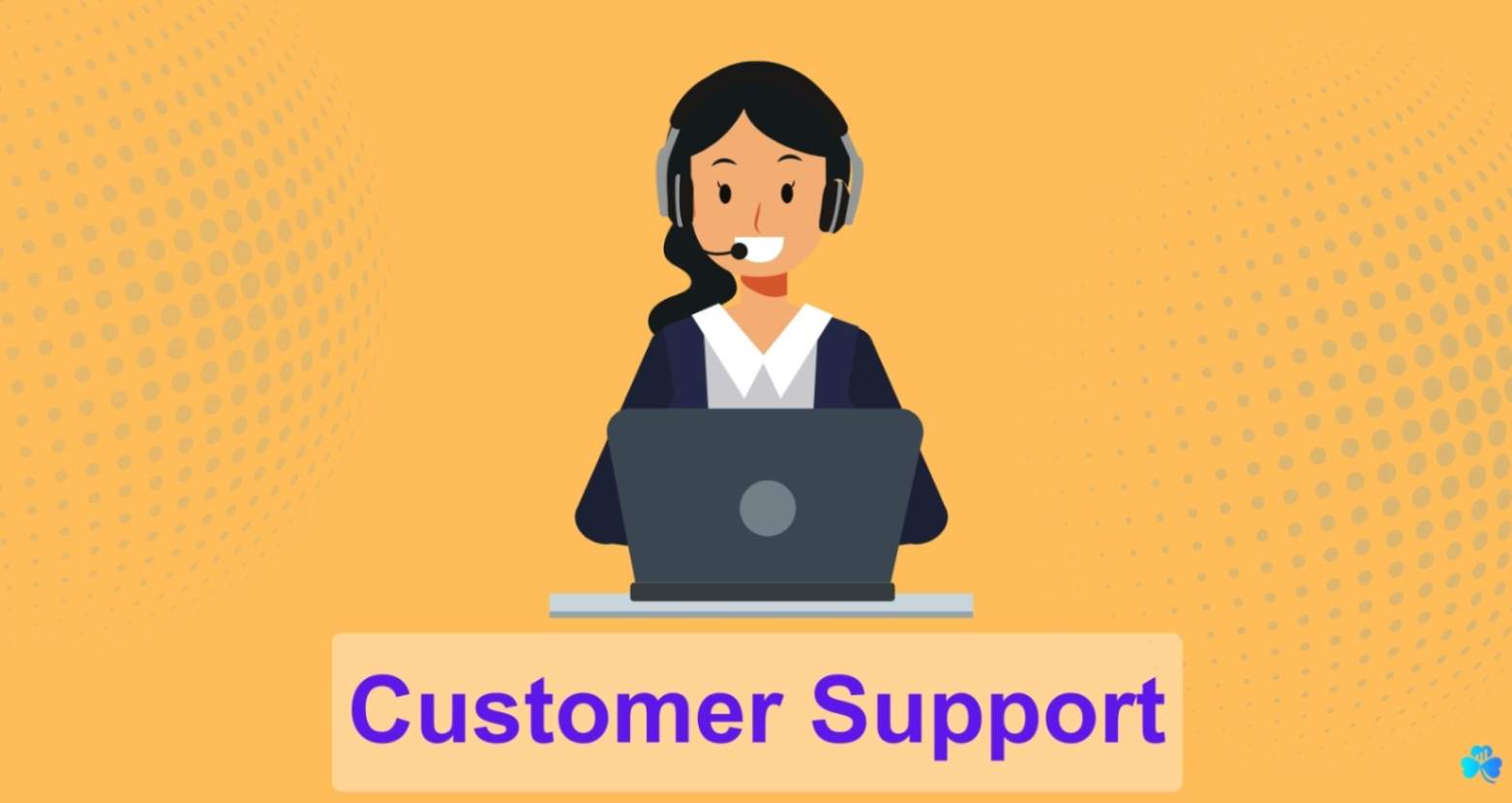
One of the biggest concerns for any business owner is what to do if something goes wrong.
Fortunately, Shopify provides 24/7 customer support to help users with any issues they might encounter.
This includes phone and live chat support, user friendly platform, and an extensive FAQ database.
Shopify also has a large community of users who can provide assistance and advice, making it easy to get the help you need to keep your store running smoothly.
4. Mobile Friendliness
The importance of mobile-friendliness to more sales in e-commerce must be considered.
With mobile taking up a whopping huge percentage of all online shopping, businesses must offer a smooth mobile experience for their customers.
A study from the source Oberlo, shows that the average mobile payment in the USA per person was $4,177 in 2022 and rising steadly to $7,827 in 2026.
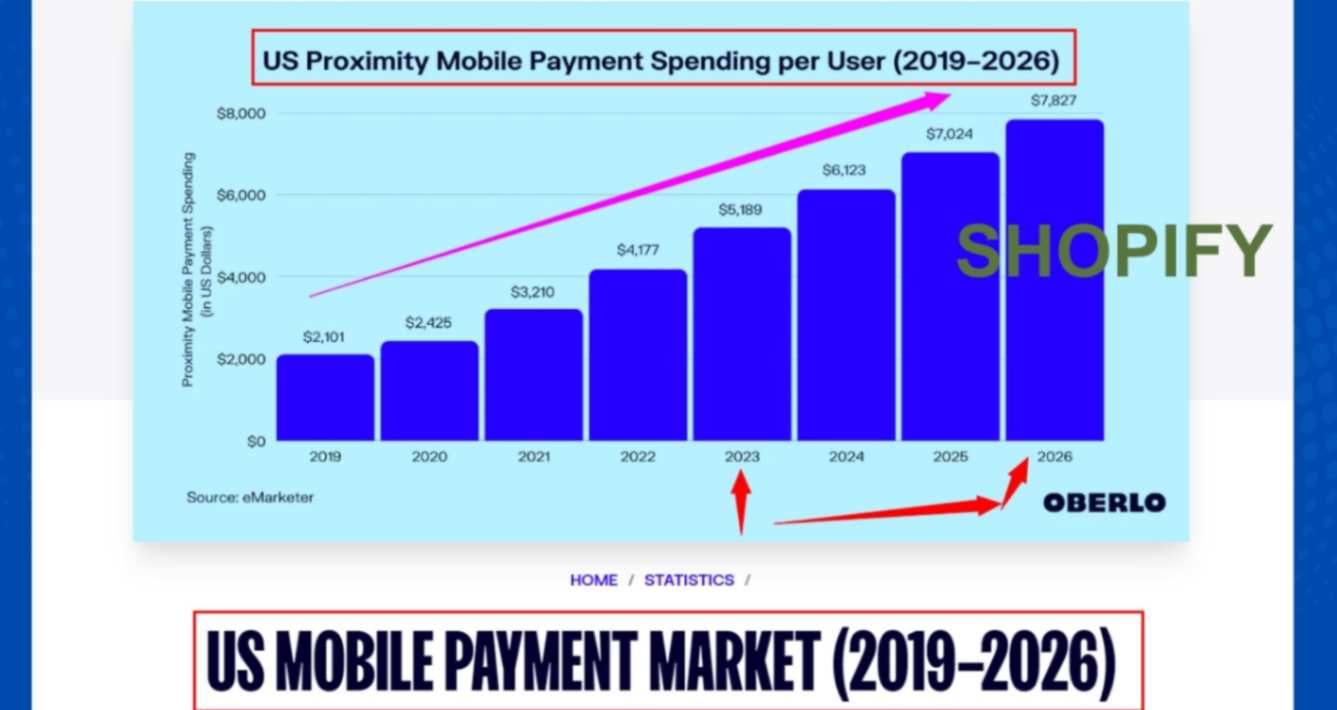
from source Oberlo
Fortunately, Shopify has always been optimized for mobile, freeing up the worry of designing your own site.
And with the added convenience of the Shopify mobile app, managing your store has become more manageable, no matter where you are.
5. Multiple Payment Processor
Shopify supports a variety of payment processors, including third-party options and payment processors like PayPal and Stripe, making it easy for users to receive Shopify payments from customers worldwide.
This is an excellent feature for small businesses looking to expand their reach and sell products online to a global audience.
In addition, Shopify's payment system is highly secure, so users can rest assured that their transactions are safe and protected.
6. Support Different Categories of E-commerce Business
Whether you're a store owner, drop shipper, retailer, wholesaler, or sell digital only products online, Shopify is a great platform.
The platform is highly customizable, so you can set up your store exactly how you want it, regardless of the nature of your business.
However, it's important to note that there are some products that Shopify restricts users from selling, such as adult content, pharmaceuticals, event tickets, and pyramid schemes.
7. Variety of Themes

The appearance of your online store can have a significant impact on your success.
That's why Shopify provides a wide range of themes explicitly designed for different categories of businesses.
This means that no matter what you're selling, there's a theme that will work for you.
In addition, there are free or paid themes that users can choose from, so you can save some money with the free design if you want to ???
Best to note before you get excited, most of the free themes are outdated with limited features!
8. Shopify App Store and Plugins
Shopify offers over 1,200 apps and plugins that integrate seamlessly with the platform, making managing everything from inventory to shipping to marketing easy.
These Shopify apps and plugins are designed to save Shopify users' time and streamline their operations, so they can focus on growing their businesses.
Whether you're looking for a mobile-friendly solution or an automated tool, an app or plugin will likely work for you.
And because Shopify is an open platform, developers are constantly creating new apps and plugins to meet the evolving needs of users.
9. SEO and Marketing
Landing page creation and marketing campaign synchronization are both made more accessible by Shopify.
The tools that Shopify offer, will help avoid a poorly designed Shopify website, which otherwise could seriously affect SEO (sometimes it is better to engage an SEO expert, to increase your profits)
In addition, limited-time discounts, such as coupon codes, credits, and other in-store spending rewards, may bring in additional consumers.
Everything needed to do so was made available on the Shopify platform.
Since Shopify's default features may not offer all the necessary tools, it might be necessary to visit the Shopify app store and find a specific tool that you need.
10. Hosting With Shopify Plus security
One of the most significant advantages of using Shopify is that it's a fully hosted platform, which means Shopify users don't need to worry about finding a separate hosting provider.
This also means that Shopify takes care of all the security and maintenance, ensuring users' sites are safe and secure.
They provide unlimited hosting and bandwidth on all plans except the Starter Plan.
Disadvantages of Shopify
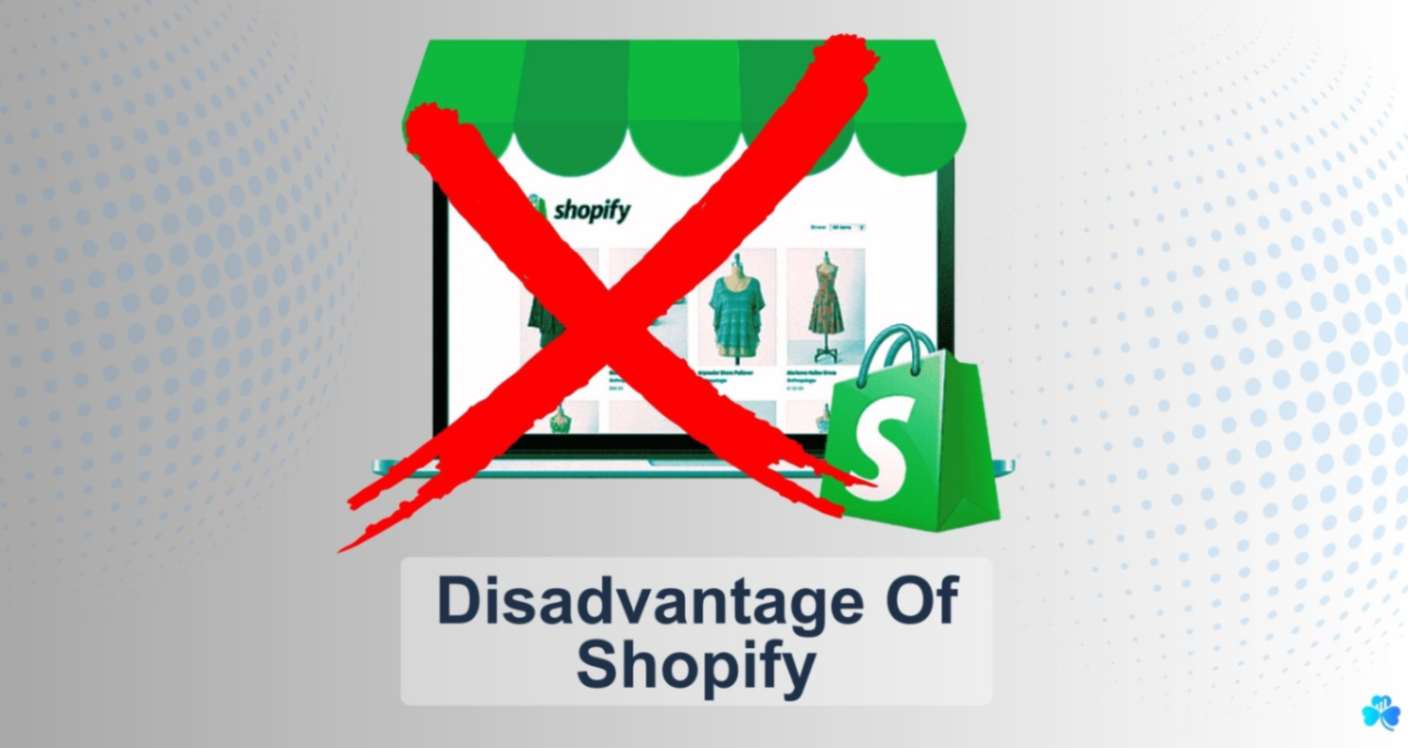
Despite the benefits of using the Shopify website, considering the drawbacks is also essential.
One of the major drawbacks is the limited options for design and customization, which is a significant highlight.
1. Little Opportunity for Design Customization
One of the disadvantages of using Shopify is the limited shopify's default features.
Although the platform offers a wide range of themes, making significant changes to the look and feel of your store may require you to hire a developer.
Poorly designed sites can discourage potential customers from engaging with your brand and affect search engine optimization.
To ensure your site is optimized, it's worth hiring an SEO expert to help you with technical SEO and initial content strategy.
2. It May Be a Costly Option
Another disadvantage of Shopify is the cost.
Users must pay a monthly fee to use the platform and additional fees for premium and advanced features too!
From our experience, I would advise you to check beforehand, each plan to see if it contains all the desired features, since the need for one feature could force you to double the cost when upgrading to higher plans!
3. Transaction Fees
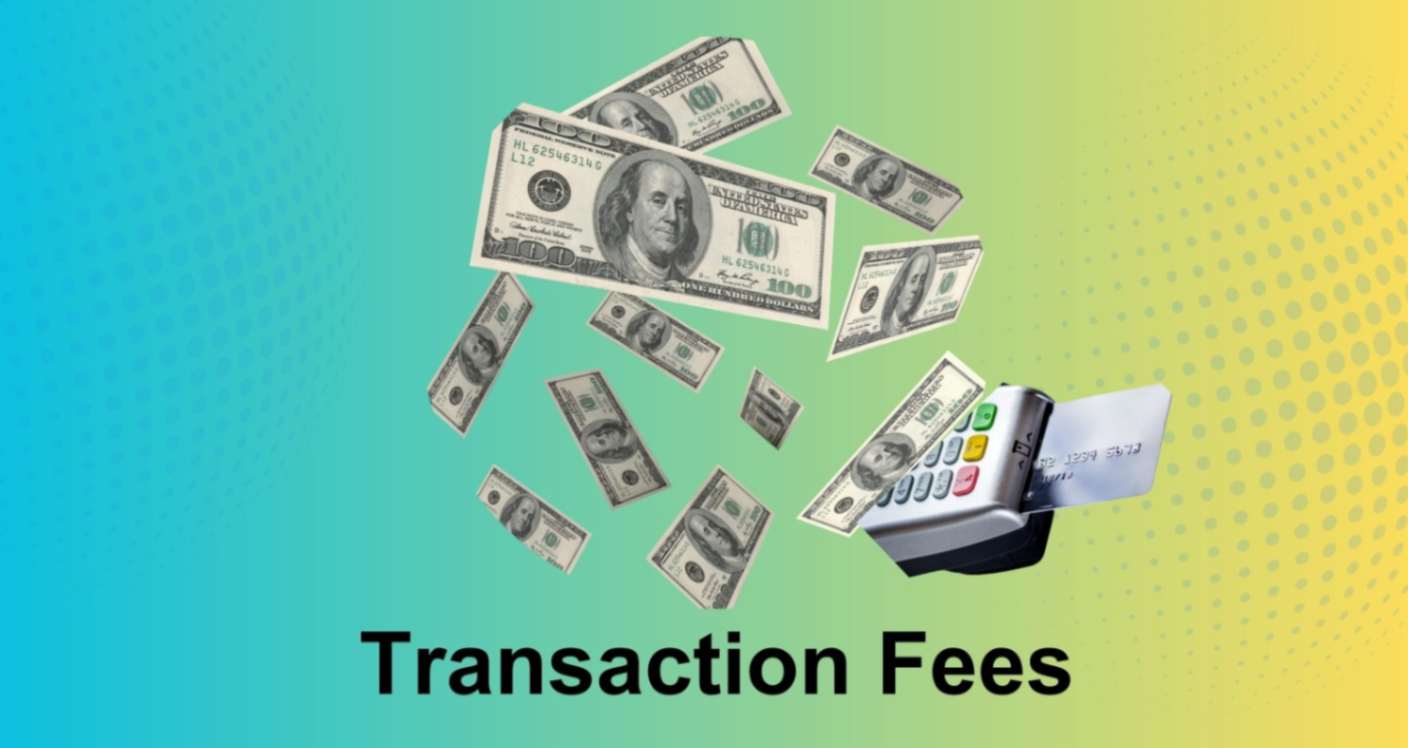
Shopify charges transaction fees for each sale, which vary depending on your chosen package.
These fees can be surprising if you do not understand how much you pay.
It's important to factor these fees into your overall budget.
4. Inaccessible Email Storage
Shopify does not include email storage service in its plans. If you want to set up an email address for your store or do email marketing.
You must find another third party email hosting provider, such as google email hosting, the price at the time of writing is $6.00 Business Starter plan.
While this is a simple process, it is another cost you must factor into your budget.
5. No Access to Marketing Automation
Shopify does not offer marketing automation tools as part of its plans.
To automate your marketing tasks, you will have to find another provider or pay a monthly fee for a Shopify app.
Despite this limitation, marketing automation is still an essential tool for growing your business, and it's worth taking advantage of its benefits.
Final Thoughts

Now that we have got the Shopify pros and cons out of the way, although it may still have its disadvantages, the advantages we think far outweigh the negatives.
With its user-friendly interface, seamless payment processing, and reliable customer service, Shopify remains one of the most popular e-commerce platforms in the world.
And let's not forget about the extensive app store, which provides endless opportunities to customize and enhance your online store.
So, if you're looking for a top ecommerce platform, to help you take your e-commerce business to new heights, Shopify is the way to go.
Don't let the potential drawbacks deter you from trying this powerful tool.
With the proper planning and execution, Shopify can be the key to unlocking your business's potential.
So, start your journey with Shopify today.
FAQs

What are the disadvantages of using Shopify?
While Shopify has many advantages, it also has some disadvantages.
Some of the most significant drawbacks include limited design customization, expensive premium features, high transaction fee, no access to email storage, and no built-in marketing automation tools.
What challenges do Shopify store owners face?
As a popular e-commerce platform, Shopify store owners encounter major obstacles in managing orders and inventory.
They often find themselves stuck in a cycle of importing orders, updating inventory, and changing order statuses, which becomes a never-ending and tedious process.
Why is Shopify better than other platforms?
Shopify stands out from other platforms due to its ease of use, extensive app ecosystem, scalability, and robust security features.
The platform is user-friendly, allowing even those with minimal technical knowledge to create a professional-looking online store.
Moreover, Shopify offers a wide range of integrations and apps, enabling store owners to customize their websites and enhance functionality.
Furthermore, Shopify's scalability supports small and large businesses, from small startups to large enterprises, and its robust security measures ensure that customers' data is well-protected.
Do I need to hire a designer to customize my Shopify store's design?
Depending on your needs, you may need to hire a designer to customize your Shopify store's design.
While Shopify offers a variety of themes, customization is limited.
However, with a little planning and development, you can create a great-looking online store and start selling products online, without needing a designer.
How does Shopify benefit customers?
Shopify benefits customers in several ways. It provides a user-friendly and streamlined shopping experience, with easy navigation, product information, and checkout processes. An excellent marketing plugin in combination with Shopify, could be ThriveCart
Shopify also offers a wide range of payment and shipping options, making it easier for customers to purchase products and receive them quickly.
SUGGESTED ARTICLES
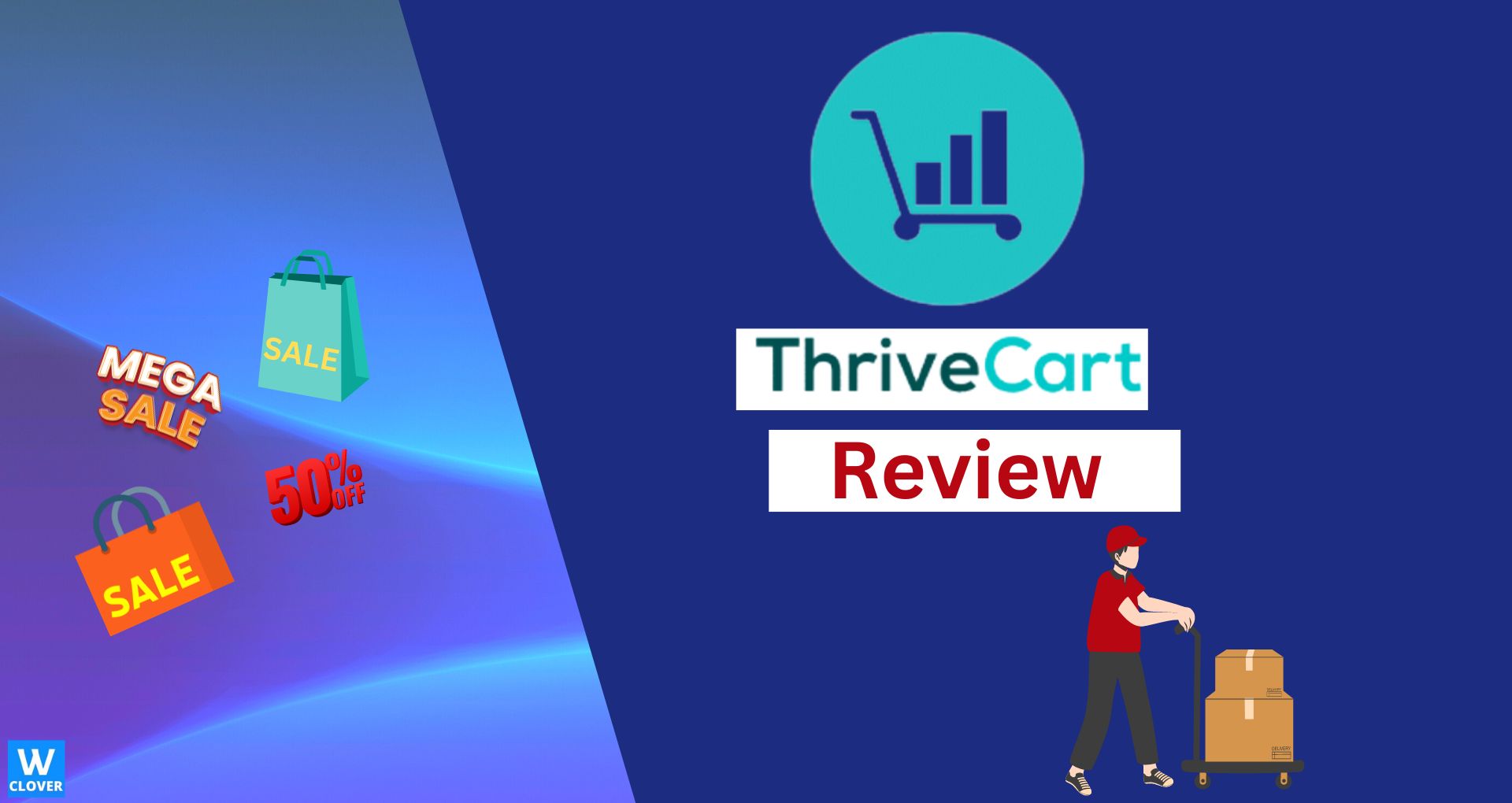
ThriveCart Review [2023]: Don’t Even Consider It before You read!
Don’t Even Consider It before You read!
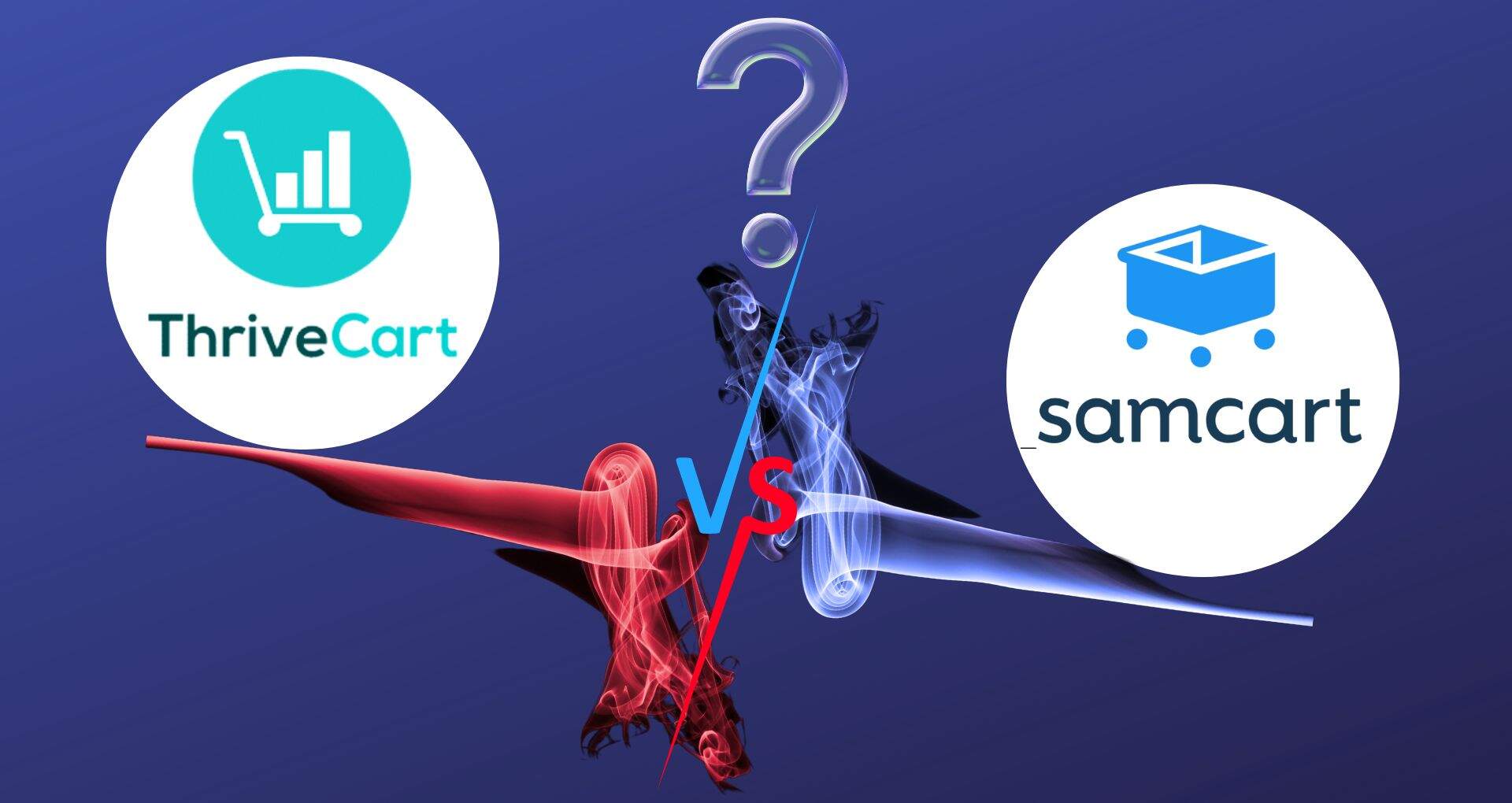
SamCart vs ThriveCart [2023] – 5 Things I Hate About SamCart!
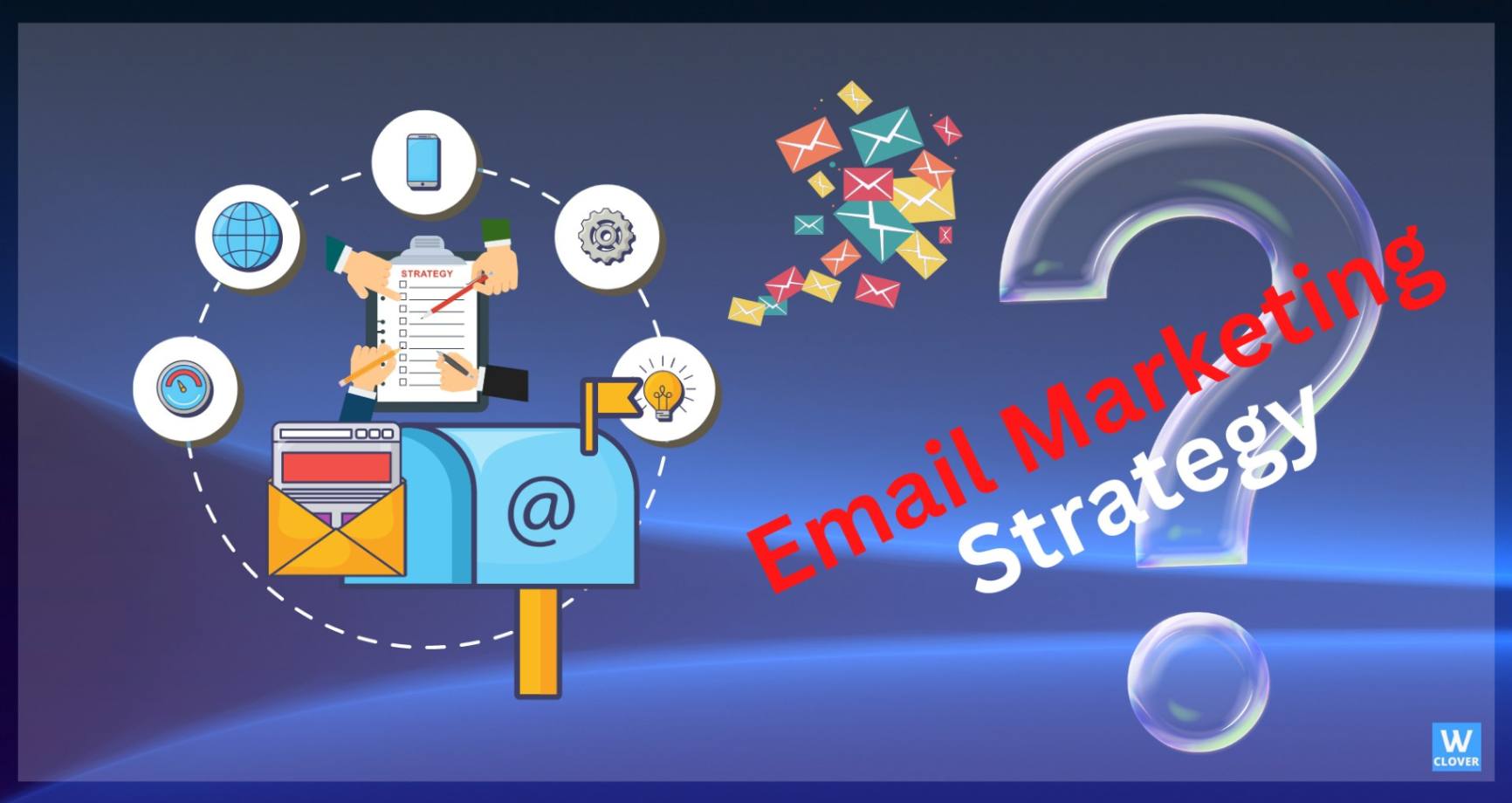
15 effective email marketing strategies to Explode your Profits In [2023]


